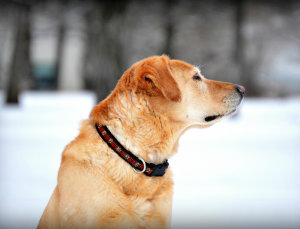02 January 2019
As with humans, pets can fall ill upon exposure to extremely cold temperatures for extended periods.
If it's cold for you, it's cold for your pet – that's the key message from the BVA as it urges pet owners to take extra precautions to ensure their dogs, cats and other small pets are kept safe from hidden and potentially fatal hazards as temperatures plunge around the UK.
As with humans, pets can fall ill upon exposure to extremely cold temperatures for extended periods. To avoid this, vets advise that dogs are walked for shorter periods of time than usual, but more frequently if required, and to consider putting a coat on old dogs or those with thin fur to keep them warm. Keep older cats inside during an extremely cold spell and ensure that even healthy young cats have easy access to shelter and warmth.
When walking your dog in ice and snow, do not let it off the lead and avoid walking in areas where ponds or lakes may have frozen over - animals often don't understand the difference between solid ground and ice and can fall through. In this situation, vets urge owners to call the emergency services for professional help rather than going in after their pet. Although distressing, it is never worth risking your own life as well as your dog's.
It's also important to wipe your dog's paws and belly on returning home from a snowy walk to remove any ice or salt, and to regularly check for cracks in paw-pads or for redness between the toes.
Small pets such as rabbits and guinea pigs that usually live outdoors are vulnerable to the cold and damp despite their furry coats. Owners with outdoor hutches and runs should be extra vigilant during the cold snap and make sure that their pets' living space is well-protected from snow, frost and winter rain and kept dry. Give rabbits and guinea pigs extra bedding to keep warm and check their water bottle or bowl regularly, as these can freeze when the temperature drops.
British Veterinary Association President Simon Doherty said,
“Extreme cold weather calls for extra precautions to keep our furry friends warm and safe. Even simple things like leaving your dog outside a shop in this weather whilst you pop in for a bit or putting your cat out all night can risk a range of avoidable illnesses.
“Domestic rabbits and guinea pigs are also vulnerable to hypothermia despite their warm coats, which is why owners need to be vigilant and take steps to ensure their hutches are protected from the snow, cold draughts and winter rain.
“If owners have any concerns about their pet in this cold weather, they should consult their local vet for advice.”
Here are some other top tips to keep pets safe this winter:
• Provide a warm, draught-free shelter: Make sure your pet's bed is in a draught-free, warm spot off the floor in the house. For outdoor pets, the hutch or run should be in a sheltered position, away from wind, rain and snow at least 10 cm off the ground.
• Take precautions during and after walks: Dogs need to be exercised; however, during the colder months, try to walk your dog for shorter periods. Wipe your dog's paws and belly on returning home from a snowy walk to remove any ice or salt, and to regularly check for cracks in paw-pads or for redness between the toes.
• Avoid antifreeze poisoning: Wiping your pets' paws can also prevent them from ingesting toxins that they may have stood in whilst outside. Antifreeze in particular is highly toxic, with almost one in four vets (23%) reporting having to treat cats for antifreeze poisoning last year.
• Temperature control for small pets: Keep the temperature of rabbit and guinea pig homes between 0⁰C - +20⁰C for rabbits (the lower temperature assumes rabbits are healthy and kept with other rabbits, with lots of bedding for warmth) and +5⁰C - +20⁰C for guinea pigs, avoiding too many fluctuations in temperature.
• Provide extra bedding for rabbits and guinea pigs: Make sure your rabbits and guinea pigs have extra bedding to keep warm during colder weather - line hutches with plenty of newspaper, provide lots of hay and cover with an old duvet/blanket/tarpaulin. If the weather becomes very severe, consider moving outdoor pets inside to a well-ventilated space with light and room to exercise – but never place them inside a garage in use, as vehicle exhaust fumes are harmful to rabbits and guinea pigs.
(Statistics referenced above are taken from the BVA Voice of the Veterinary Profession Panel February 2018 survey.)



